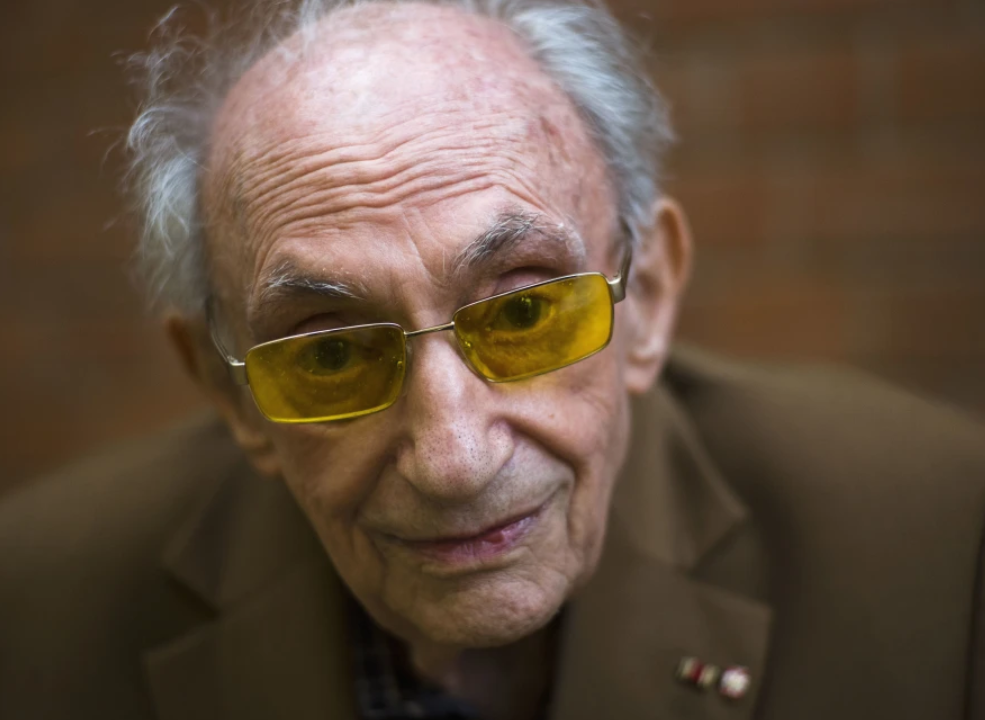Walter Frankenstein, a Holocaust survivor who spent his later years educating young people about the atrocities of the Holocaust, has passed away at the age of 100. Klaus Hillenbrand, a close friend and author of a book about Frankenstein, confirmed his death on Tuesday, stating that he died the previous day. The foundation that manages Berlin’s Holocaust memorial also confirmed his death on Monday in Stockholm.
Frankenstein was born in 1924 in Flatow, a town that is now part of Poland but was then in Germany. In 1936, after the Nazis came to power, he was no longer allowed to attend public school due to his Jewish heritage. With help from an uncle, his mother sent him to Berlin to continue his education, and he later trained as a bricklayer at the Jewish community’s vocational school. He lived at the Jewish Auerbach’sche Orphanage, where he met Leonie Rosner, who would become his wife.
In a 2018 interview, Frankenstein recalled witnessing Kristallnacht, the “Night of Broken Glass,” on November 9, 1938. During this event, Nazis and ordinary Germans attacked Jews across Germany and Austria, killing at least 91 people, destroying 7,500 Jewish businesses, and burning over 1,400 synagogues. The next day, when Frankenstein walked to school, he saw the streets covered in broken glass. At just 14 years old, he was deeply affected by the violence.
From 1941, Frankenstein was forced into labor in Berlin and constantly feared being deported by the Nazis. In 1943, just five weeks after the birth of their son Peter-Uri, he and his wife went into hiding to avoid being deported to Auschwitz. They spent 25 months in hiding with their infant son, moving between friends’ homes and bombed-out buildings. A second son, Michael, was born in 1944 during their time in hiding. Out of around 7,000 Jews who went into hiding in Berlin, only 1,700 survived, with the rest either arrested, succumbing to illness, or killed in air raids.
When Berlin was liberated by the Soviet Red Army in 1945, Frankenstein’s children were among the youngest of just 25 Jewish children to survive in the city. Before the Holocaust, Berlin had the largest Jewish community in Germany, with around 160,500 Jews living there in 1933. By 1945, that number had dwindled to about 7,000 due to emigration and extermination. Overall, six million Jews were murdered in the Holocaust.
After the war, Frankenstein and his family immigrated to Palestine, which later became Israel. In 1956, they moved to Sweden, where they settled permanently. Later in life, Frankenstein returned to Germany several times a year to speak to students about his experiences. In 2014, he was awarded Germany’s highest honor, the Order of Merit.
An avid fan of the Hertha Berlin soccer club, Frankenstein had attended matches as a teenager, but during the Nazi era, Jews were barred from attending games, so he would listen to match reports on the radio. In 2018, he was made an honorary member of the club, receiving membership number 1924, the year of his birth.
When Frankenstein traveled to Berlin in his later years, he always carried with him the small blue case that held his Order of Merit. Inside the case’s lid, he had attached the first “mark” he received from the Nazis: the yellow star, or Jewish badge, that Jews were forced to wear during the Nazi regime to identify them as Jews. He often said, “The first one marked me, the second one honored me.”













